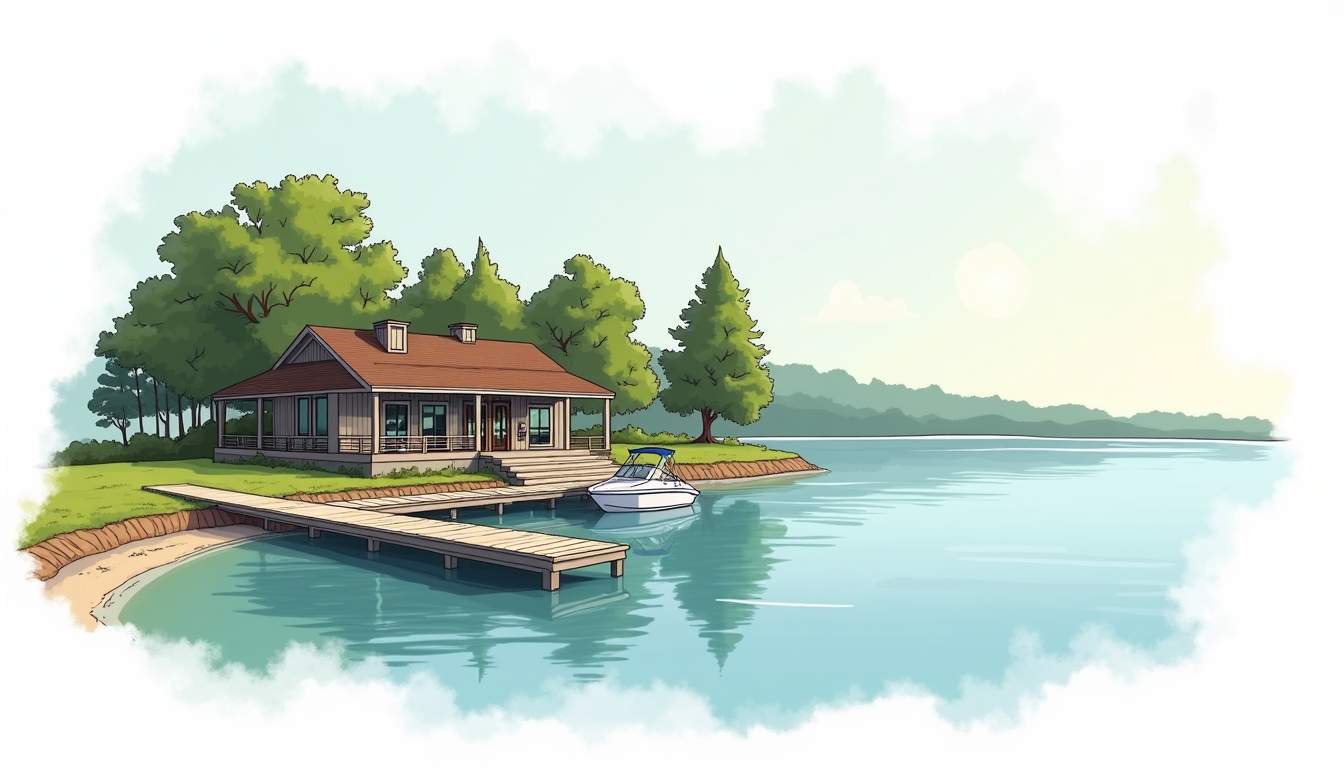
Boat and club access vacation homes combine waterfront convenience with community amenities, creating a type of holiday rental that appeals to a wide range of travelers. These properties offer access to docks, moorings, or shared boats alongside recreational facilities such as pools, tennis courts, and private beaches. This guide explains what to expect, how to choose the right place, legal and safety considerations, and tips to make the most of a stay.
Not every waterfront rental includes boating privileges or community club facilities. Boat and club access vacation homes specifically advertise access to on-site or nearby nautical amenities and organized community resources. That can mean anything from a townhouse with a reserved slip at a shared marina to a villa inside a gated community with a private yacht club, fitness center, and dining options.
The distinction matters because these properties often carry additional fees, rules, and expectations. Boat slips, dock reservations, club memberships, and equipment rentals change the experience compared to a standalone cottage by the water. For many travelers, the extra convenience and activity options are worth the trade-offs, while others prefer a simpler, quieter stay.
Boat access can be private (a dedicated slip or boathouse), semi-private (shared with a limited number of homes), or public (nearby marina with slips for rent). Private slips are typically included in the rental and offer the most convenience, while public marinas provide flexibility but require reservations and possible transport to the rental.
Clubs often provide amenities beyond boating, such as pools, fitness centers, spa services, dining rooms, and social events. Some clubs have strict dress codes or reservation requirements. It's important to confirm which amenities are included with the rental and which require additional membership or guest fees.
Selecting a boat and club access vacation home depends on priorities like boating frequency, group size, privacy level, and budget. A family wanting regular water time may prioritize an on-site slip and kid-friendly club activities, while a couple seeking relaxation might prefer quieter marina access and spa facilities.
Research is essential: read reviews, verify what’s included, and ask specific questions about boat size limits, parking for trailers, shore power availability, and club guest policies. Location also matters—properties close to popular waterways or protected harbors are more convenient for boating, while those near estuaries or open seas suit more experienced boaters.
Key questions include whether a boat slip is included, whether the property provides life jackets and safety kits, what the maximum boat length is, and if there are restrictions on the type of watercraft allowed. Also ask about who maintains the dock, the process for reserving club facilities, cleaning fees for saltwater exposure, and any security deposits related to boat use.
Align the property’s sleeping capacity, layout, and amenities with the group’s needs. Multi-generational families may prioritize multiple bedrooms and accessible ground-floor spaces, while friend groups might look for larger common areas, proximity to nightlife, or multiple bathrooms for flexibility.
Boat and club access can add several cost layers to a vacation rental. Base nightly rates often don't reflect dock fees, club initiation or daily guest charges, fuel surcharges for boats, cleaning fees, and insurance requirements. Budgeting for these extras avoids surprises and allows for better comparison between properties.

Some communities charge a refundable security deposit for boat use, and others require the renter to pay for a temporary club membership. Additionally, equipment rentals—kayaks, paddleboards, or motorboats—are often billed separately. Clarify whether linens, beach towels, and on-property parking are included in the rate.
Common fee types include dock or slip fees, transient moorage, club guest fees, damage deposits, cleaning fees, and utility surcharges for heavy use. Understanding the refund policy for deposits and which fees are mandatory versus optional will simplify the decision-making process.
When comparing listings, calculate the total cost across a realistic stay length instead of focusing only on the nightly rate. It’s acceptable to ask hosts about discounts for longer stays or off-peak weeks. In some cases, last-minute bookings or flexible dates can reduce costs substantially.
Water activities come with inherent risks that should be addressed before arrival. Confirm which safety equipment is available and who is responsible for maintaining it. Make sure the property provides life jackets in appropriate sizes, functioning navigation lights on shared docks, and clear instructions for emergency contact procedures.
Insurance matters: check whether the rental includes liability coverage for guests using boating equipment, or if the renter must obtain temporary coverage. If bringing a personal boat, verify that the marina accepts guest vessels and that insurance and registration documents are up-to-date and compliant with local rules.
Different regions enforce distinct boating rules, such as no-wake zones, seasonal restrictions, and protected wildlife areas. Compliance with local regulations not only preserves the environment but also reduces the risk of fines or confiscation of equipment. Hosts typically provide a brief on local rules, but confirming via marina staff or local authorities adds assurance.
In case of an accident or damage, follow documented procedures: notify the host or club management, seek medical assistance if needed, and document the incident with photos and written accounts. Prompt communication can often prevent misunderstandings and speed up insurance processes.
Packing smart improves the experience at a boat and club access vacation home. Essentials include motion-sickness remedies, layered clothing for changing weather, water shoes, hats, sunscreen, and a waterproof phone case. Bring a small first aid kit tailored for minor boating injuries like cuts or sunburns.

Plan boating outings according to tides, weather forecasts, and local recommendations. Create a flexible itinerary that balances active days on the water with downtime at the club, dining, or local sightseeing. If planning to fish, research licensing requirements and local catch rules.
Determine whether the property’s kitchen is stocked with cookware and utensils, and whether the club or nearby marinas offer fuel, ice, and provisions. Some remote coastal rentals require stockpiling non-perishables and planning for fewer restaurant options, while many club-centered properties are within walking distance of grocery stores and eateries.
Consider how boats and trailers will be transported and where they can be parked. Some communities restrict trailer parking near docks or require a small fee for long-term trailer storage. Confirm loading zones and whether assistance is available for launching larger vessels.
Respectful behavior contributes to a pleasant stay for everyone. Adhere to quiet hours, clean up after using club facilities or docks, and follow posted rules regarding alcohol, pets, and guest limits. Clubs may have specific conduct expectations—for example, footwear rules in dining areas or designated swim zones to separate swimmers from boat traffic.
When interacting with neighbors or club staff, courteous communication goes a long way. Reporting maintenance concerns or hazardous conditions promptly supports safety and often results in quicker resolution.
Before departure, follow any check-out instructions regarding dock equipment, trash disposal, and returned keys or access cards. Removing food that attracts wildlife, rinsing saltwater equipment, and ensuring all club amenities are left in good order reduces friction and preserves future rental opportunities.
To get the most from a boat and club access vacation home, mix planned activities with spontaneous exploration. Early morning paddle sessions often reveal calm waters and quiet wildlife, while evenings at the club provide chances to socialize and enjoy sunset views. Taking lessons or guided tours offered by the club can enrich the trip and build new skills.
For those seeking relaxation, choose a property with private outdoor spaces—decks, screened porches, or terraces—that encourage lingering with a book or watching boats come and go. For adventure seekers, prioritize access to varied waterways, nearby islands, or locations with equipment rentals for stand-up paddleboards, windsurfing, and diving.
Exploring local marinas, fish markets, and waterfront festivals reveals regional culture and cuisine. Seasonal events—boat parades, fishing tournaments, and regattas—often require early planning but can be highlights of a trip. Respect local fishing practices, indigenous heritage sites, and protected habitats to ensure sustainable tourism.
Peak seasons for boating properties depend on climate and destination. Summer months are busiest in temperate regions, while winter can be peak in warm-weather getaways. Book well in advance for holidays and weekends, and seek shoulder seasons for lower rates and fewer crowds while still enjoying favorable weather.
Boat and club access vacation homes offer a unique blend of water-based recreation and community amenities that can elevate a vacation. Careful planning—clarifying included services, understanding fees, prioritizing safety, and respecting community rules—ensures an enjoyable and memorable stay. Matching property features to the group's interests and budget will make the difference between a good trip and an exceptional one.

Whether the aim is early-morning fishing, lazy afternoons by the pool, or evening socializing at the club, these properties provide a versatile platform for both adventure and relaxation. With proper preparation and awareness of local conditions, a boat and club access vacation home can deliver the perfect coastal retreat.
Ready to elevate your waterfront living experience? At Tennessee National, luxury meets community with exclusive access to a private marina, Greg Norman Signature Golf Course, waterfront dining, and over 20 member amenities nestled in Tennessee’s scenic landscape. Whether you desire a move-in ready home or a custom build, our gated community offers the perfect blend of adventure and relaxation. Schedule a private tour today and start making unforgettable memories at Tennessee National.